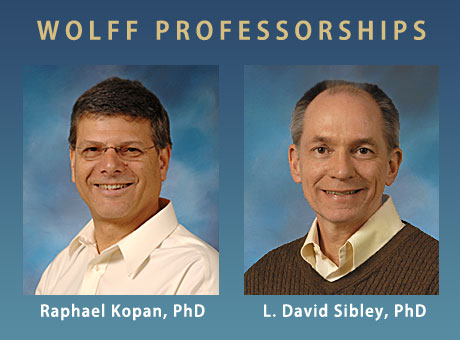
Wolff professorships
Two faculty members honored for key medical research

Two leading members of the faculty have been named Alan A. and Edith L. Wolff Professors in their respective fields. Raphael Kopan, PhD, has been named the Wolff Professor of Developmental Biology, and L. David Sibley, PhD, has been named the Wolff Professor of Molecular Microbiology.
“Raphael Kopan’s research is revealing new details of how an important protein guides the development of many of the body’s tissues,” says Larry J. Shapiro, MD, executive vice chancellor for medical affairs and dean of the School of Medicine. “David Sibley studies a common parasite’s role in causing illness, helping develop new insights into its deadly microbial sibling, the malaria parasite.”
Kopan joined Washington University as an assistant professor of medicine and of molecular biology and pharmacology. He studies a protein called Notch that is instrumental in guiding embryonic cells’ development into the body’s many tissue types. Because Notch is present in so many cell types, Kopan’s lab has contributed to medical research across an array of disciplines, from Alzheimer’s disease to asthma to cancer.
Sibley was recruited as an assistant professor of molecular microbiology and was promoted to full professor in 2002. His lab focuses on Toxoplasma gondii, a parasite that may infect as many as one in every four humans. The parasite rarely causes symptoms but can become a potentially life-threatening infection if the immune system is weakened by illnesses such as HIV or suppressed to facilitate an organ transplant.
Sibley’s studies reveal how Toxoplasma and its relatives, including the malaria parasite Plasmodium falciparum, infect cells in the human body and
hence cause disease.
The late Alan and Edith Wolff supported medical research at the School of Medicine for more than three decades. In 2007, Edith Wolff gave $20 million to Washington University School of Medicine to establish the Alan A. and Edith L. Wolff Institute, supporting biomedical research projects leading to the prevention, treatment and cure of disease.






